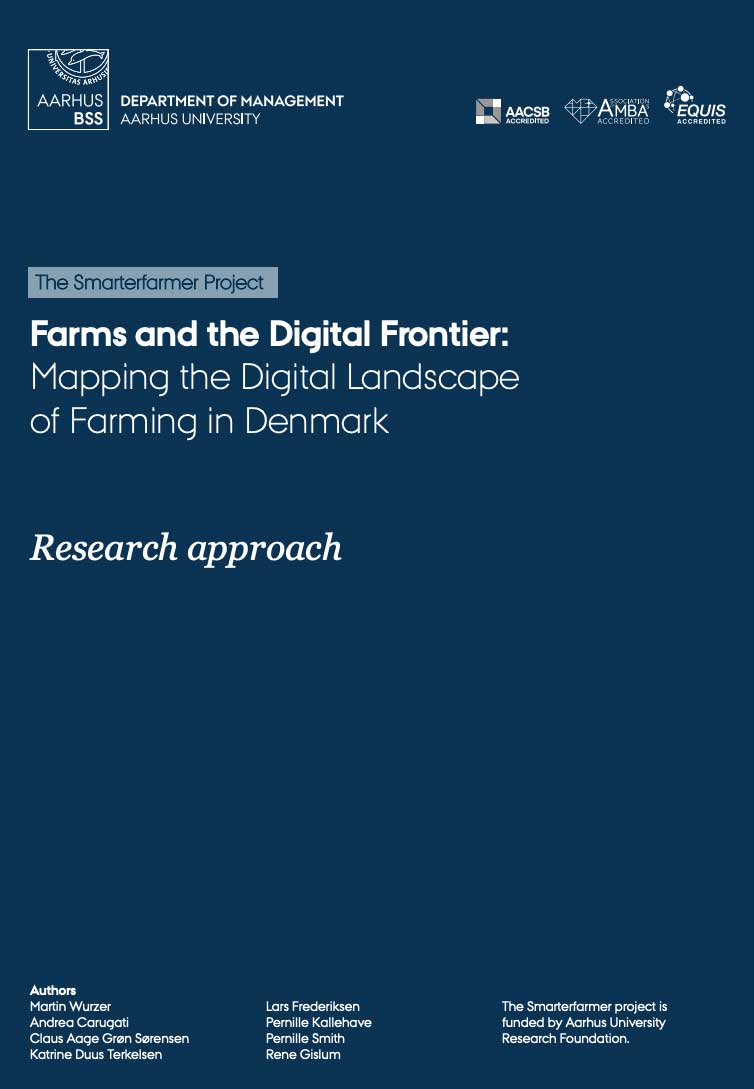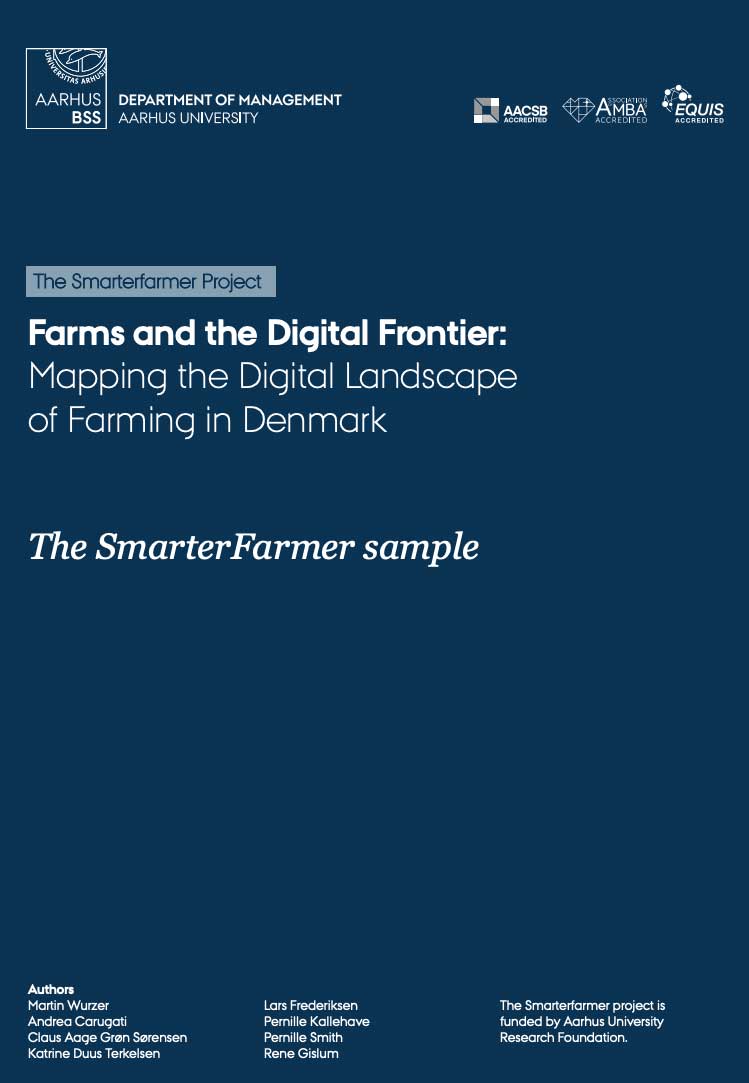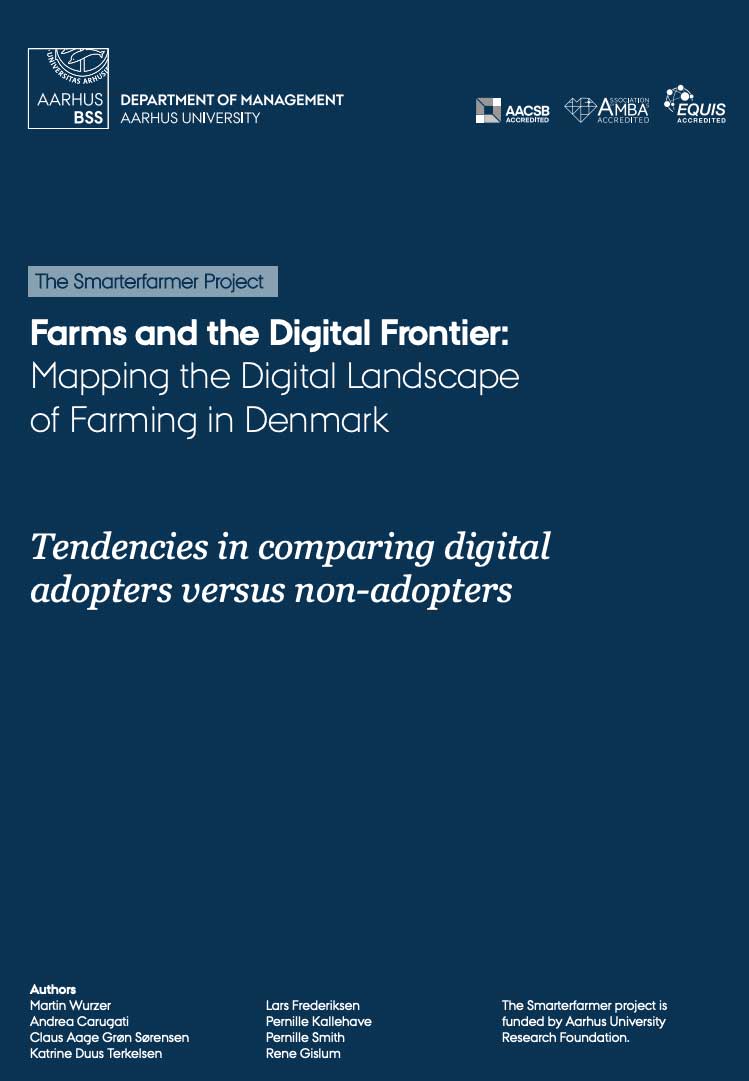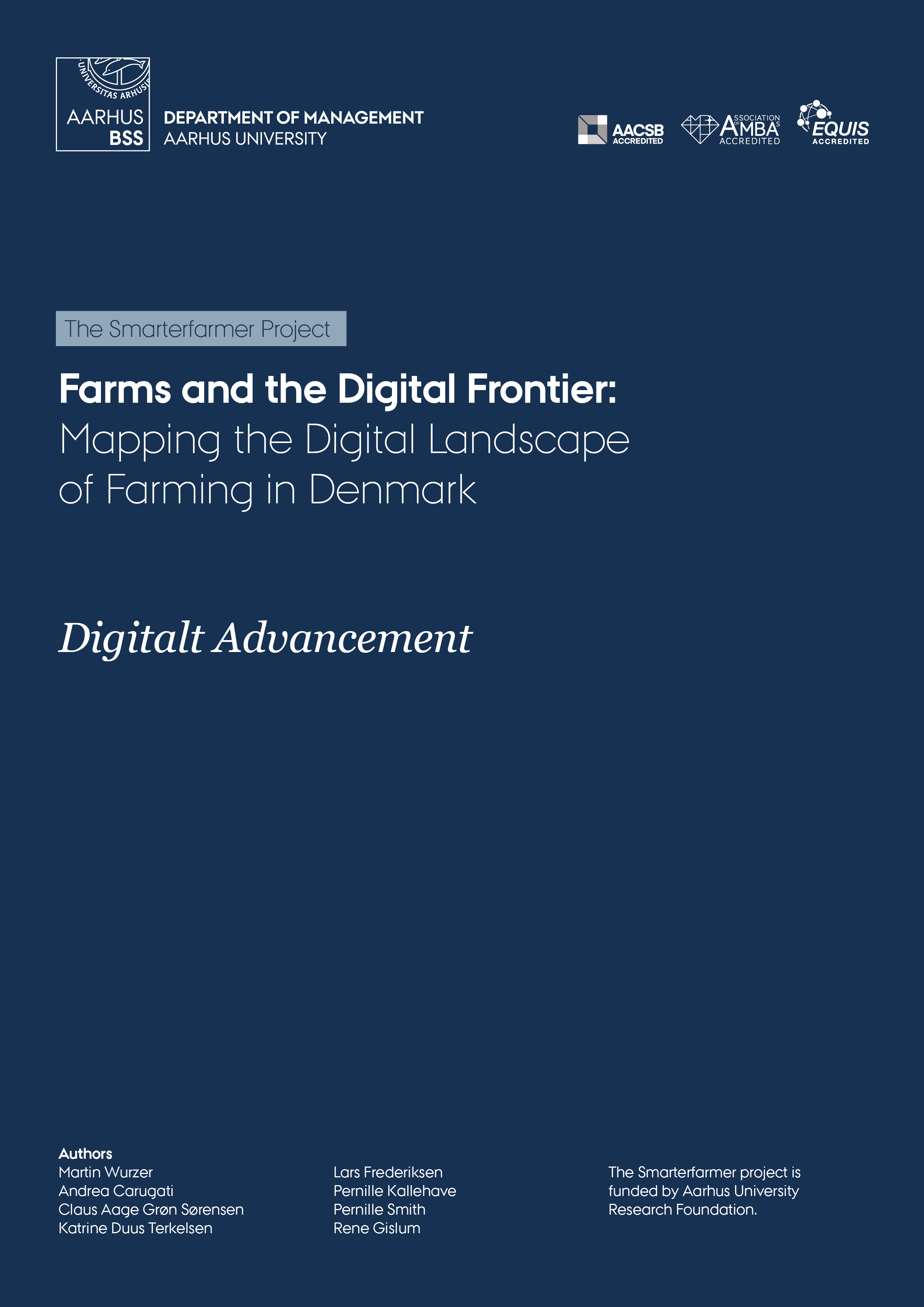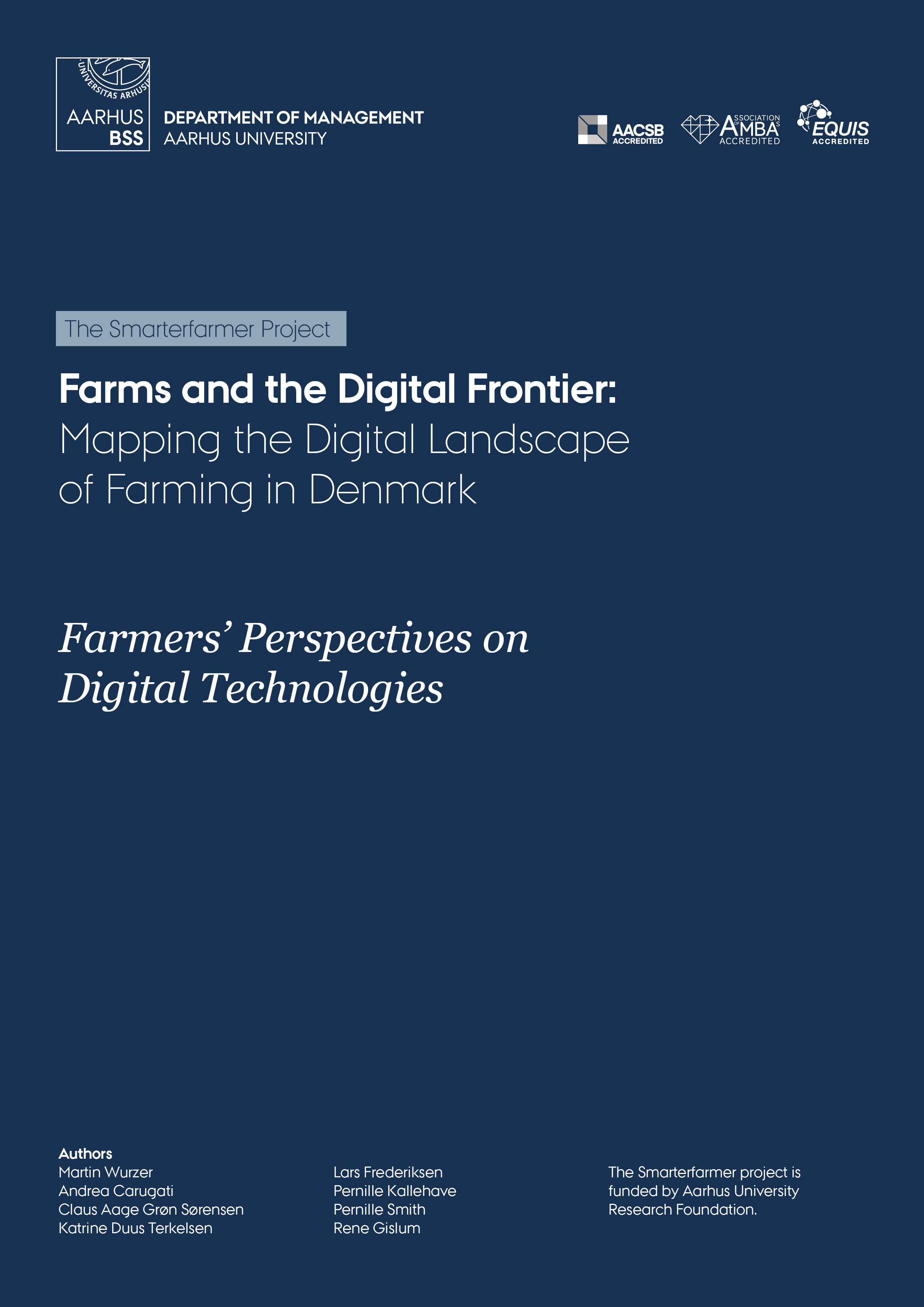
SmartER-FarmER
Ledelse og organisering af digital transformation i agro-fødevaresektoren
Introduktion
Forskning indenfor de natur- og tekniske videnskaber fastslår, at omstilling til et bæredygtigt dansk/europæisk landbrugsproduktionssystem kan drives af nye digitale teknologier.
Flere rapporter påpeger, at det faktisk er muligt at forbedre landbrugsbedrifternes bæredygtighedsprofil og samtidig bevare produktiviteten intakt ved at indføre og tilegne sig digitale teknologier f.eks. præcision og intelligent landbrug.
Digitale teknologier er radikalt forskellige fra traditionelle ofte mekaniske landbrugsteknologier. De er typisk mere abstrakte og systemiske af natur (f.eks. øgede muligheder for data, hastighed osv.). Digitale teknologier udfordrer dermed den eksisterende kompetenceprofil, organisering af aktiviteter og måske hele tankegangen blandt landmænd, landbrugsrådgivere og andre interessenter i agro-fødevaresystemet.
Udfordringerne ifm. omstillingen er dermed mindre tekniske, men vedrører snarere kompetencer, kultur, ledelsesmæssige tilgange og organisatoriske strukturer og strategier.
Implementering og brug af digitale teknologier handler mere om menneskers tankegang, deres adfærd og opfattelser end om teknologierne og teknik i sig selv.
Projektet
Projektet SmartER-FarmER har til formål at undersøge disse problemstillinger via et nyt tværfagligt partnerskab mellem forskningsfelterne agroøkologi, ingeniørvidenskab, teknologistyring og -ledelse.
Forskningen følger to spor: Det første er at identificere og kortlægge de aktuelle organisatoriske og ledelsesmæssige begrænsninger og drivkræfter for digital teknologiadoption i landbruget. Det anden zoomer ind på at forstå og forklare processerne for tilegnelse og anvendelse af digitale teknologier, der fører til produktivitetsgevinster.
Projektet kører fra januar 2023 til og med juli 2025.
Projektet er støttet af Aarhus Universitets Forskningsfond
Kontakt
Ny stor undersøgelse af digitalisering i dansk landbrug
I vores tværfaglige forskningsprojekt Smarterfarmer har vi i 2024 undersøgt danske landmænds brug af og holdning til digitale værktøjer som præcisionslandbrug (PA) og farm management information systems (FMIS).
Vi er nu klar med de første fire kapitler.
Resultaterne fra undersøgelsen, en af de største nationale studier i sit felt, viser tydeligt, at adoptionen af digitale teknologier varierer med bedriftens størrelse, produktionsform, regionale forhold og landmændenes erfaring og baggrund.
Hovedindsigten: Re-industrialiseringen er ikke én ensartet proces – den er mangfoldig og afhænger af konkrete praksisser og behov på den enkelte gård. For at skabe økonomisk, miljømæssigt og socialt bæredygtige fødevaresystemer, må vi forstå landmændenes perspektiv og integrere deres erfaringer i udviklingen af digitale løsninger.
Det er i spændingsfeltet mellem teknologi og praksis, at fremtidens landbrug virkelig formes.
Der kommer mere
Postdoc Katrine Duus Therkelsen er i fuld gang med at interviewe landmænd landet over, så vi kan supplere data fra spørgeskemaet med kvalitative data.
I de kommende måneder dykker vi længere ned i de mange data med videre analyser.
The Smarterfarmer Project
Farms and the Digital Frontier: Mapping the Digital Landscape of Farming in Denmark
Teamet bag
Smarterfarmer | In English
Management and organization of digital transformation in the agri-food sector
Research in the natural and technical sciences reveals that the transformation towards a sustainable DK/EU agricultural production system could be driven by adoption of new digital technologies. Digital technologies are radically different from traditional farming technologies because they are typically more abstract and systemic by nature (e.g., increased opportunities in data, speed, etc.). The process of digitalization challenges the existing competence profile, organization of activities and perhaps the entire mindset among farmers, agricultural advisers, and other stakeholders in the agri-food system. Yet so far, several reports points out how it is indeed possible to improve the sustainability profile of farms while keeping productivity intact by adopting and appropriating digital technologies (e.g., precision and smart farming). What these reports uniformly highlight is that the challenges are less technical in character but rather are concerned with competences, culture, managerial approaches, and organizational structures and strategies. Hence, adoption and use of digital technologies connects more to the mindsets of people, their behaviors, and perceptions, than to the technologies per se. This project SmartER-FarmER aims to tackle these issues with a new interdisciplinary partnership between the research fields of agroecology, engineering, and management of technology.
The project identifies and explains: (1) the specific managerial and organizational drivers and barriers for the digital transformation of farming in order to (2) develop a set of managerial and policy recommendations to enable increased productivity with decreasing inputs while meeting or exceeding sustainability targets.



